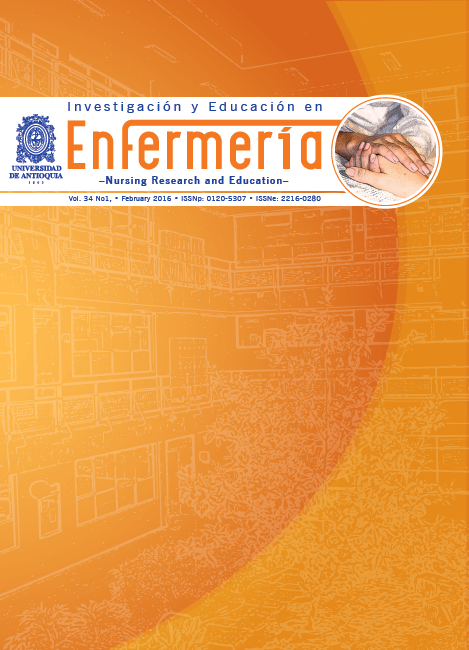Functional social support in family caregivers of elderly adults with severe dependence
DOI:
https://doi.org/10.17533/udea.iee.25990Keywords:
Social support, frail elderly, caregivers, community health nursing.Abstract
Objective. This work sought to determine functional social support in family caregivers of severely dependent elderly adults and its relationship with sociodemographic characteristics.
Methods. This was a cross-sectional study. The Duke-UNC-11 Functional Social Support questionnaire was applied to 67 family caregivers from Family Healthcare Centers in Valdivia (Chile) in 2012.
Results. Family caregivers perceived low levels of affective social support (49.3%) and of trust (98.5%); considering insufficient the information and advice they receive related, principally, to the scarce number of people who help, they need to establish communication to share their feelings and problems derived from the task of caring. These caregivers recognize the support from community healthcare centers. Functional social support is correlated to the following variables: number of people who live in the home, years of study, age of the caregiver, and number of people who help; with this last variable predicting the level of social support in its two dimensions.
Conclusion. Family caregivers of severely dependent elderly adults perceive a level of functional social support, especially in the dimension of trust. Community nurses must increase the number of home visits, evaluate the needs for social support perceived in caregivers, and teach coping strategies to mitigate problems that emerge in this work.
How to cite this article: Flores E, Seguel F. Functional social support in family caregivers of elderly adults with severe dependence. Invest Educ Enferm. 2016; 34(1): 67-73
Downloads
References
(1) House JS. Work stress and social support. Beverly Hills, CA: Sage; 1981.
(2) Cuéllar I, Dresch V. Validación del Cuestionario de Apoyo Social Funcional Duke-UNK-11 en personas cuidadoras. RIDEP. 2012; 34(1):89-101.
(3) Zarit SH, Davey A, Edwards AB, Femia EE, Jarrott SE. Family Caregiving: Research Findings and Clinical Implications. Compr Clin Psychol. 1969; 7 (22): 499-523.
(4) Flores E, Rivas E, Seguel F. Nivel de Sobrecarga en el Desempeño del Rol del Cuidador Familiar de Adulto Mayor con Dependencia Severa. Cienc Enferm. 2012; 18(1):29-41.
(5) Cheng S, Lam L, Kwok T, Ng N, Fung A. The Social Networks of Hong Kong Chinese Family Caregivers of Alzheimer’s Disease: Correlates with Positive Gains and Burden. Gerontologist. 2013; 53(6):998–1008.
(6) Tirado G. Apoyo social en el cansancio del rol del cuidador. Evidentia [Internet]. 2009 [cited 20 Nov 2015]; 6 (25). Available from: www.index-f.com/evidentia/n25/ev0625.php
(7) Broadhead WE, Gehlbach SH, Degruy FV, Kaplan BH. The Duke-UNC functional social support questionnaire: measurement of social support in family medicine patients. Med Care 1988; 26:709-23.
(8) Domínguez M, Arruda F, Montiel-b M, Ochoa P, Hernández G, Valdez L, Ibarra E. Social support needs of Mexican elders family caregivers. Psicol Soc. 2009; 21(2):242- 9.
(9) Espinoza K, Jofre V. Sobrecarga, Apoyo Social y Autocuidado en Cuidadores Informales. Cienc Enferm. 2012; 18(2):23-30.
(10) Chiou CJ, Chang HY, Chen IP, Wang HH. Social support and caregiving circumstances as predictors of caregiver burden in Taiwan. Arch Gerontology Geriatr. 2009; 48:419-24.
(11) Leggett AN, Zarit S, Taylor A, Galvin JE. Stress and Burden among Caregivers of Patients with Lewy Body Dementia. Gerontologist. 2011; 51(1):76-85.
(12) Servicio Nacional del adulto Mayor. Estudio Nacional de la Dependencia en las Personas Mayores [Internet]. INTA. Chile; 2010 [cited Nov 20 2015]. Available from: http://www.senama.cl/filesapp/Estudio_dependencia.pdf
(13) Remor E. Social Support and Quality of Life in the HIV Infection. Aten Primaria. 2002; 30(3):143-8.
(14) Medina J. Cuidados enfermeros de calidad: la necesidad de mirar al cuidador. Enferm Comun [Internet]. 2013 [cited 20 Nov 2015]; 9(2). Available from: http://www.index-f.com/comunitaria/v9n2/ec9533.php
(15) Orkaizagirre A. Visibilizando los Cuidados enfermeros a través de la Relación de Cuidado. Index Enferm [Internet]. 2013 [cited 20 Nov 2015]; 22(3). Available from: http://www.index-f.com/index-enfermeria/v22n3/1246.php
(16) Pabón D, Galvis M, Cerquera A. Diferencias en el apoyo social percibido entre cuidadores informales y formales de pacientes con demencia tipo Alzheimer. Psicología desde el Caribe. 2014; 31 (1): 59-77.
(17) Puerto H. Calidad de vida y soporte social percibido en los cuidadores familiares de personas en tratamiento contra el cáncer. [Dissertation]. Colombia. Universidad Nacional de Colombia; 2013 [cited 20 Nov 2015]. Available from: http://www.bdigital.unal.edu.co/40203/1/539786.2014.pdf
Downloads
Published
How to Cite
Issue
Section
License
Derechos de propiedad / Direitos de Propriedade
English: If the article is accepted for publication, all copyright will be of exclusive property of Investigación y Educación en Enfermería. The text and the graphics included in the publication are exclusive responsibility of the authors and not necessarily reflect the thought of the Editorial Committee.
Español: Si el artículo es aprobado para publicación, todos los derechos son de propiedad de Investigación y Educación en Enfermería. El texto y las gráficas incluidas en la publicación son de exclusiva responsabilidad de los autores y no necesariamente refleja el pensamiento del Comité Editorial.
Português: Se o artigo for aceito para publicação, todos os direitos autorais serão de propriedade exclusiva de Investigación y Educación en Enfermería. O texto e os gráficos incluídos na publicação são de responsabilidade exclusiva dos autores e não refletem necessariamente o pensamento do Comitê Editorial.















